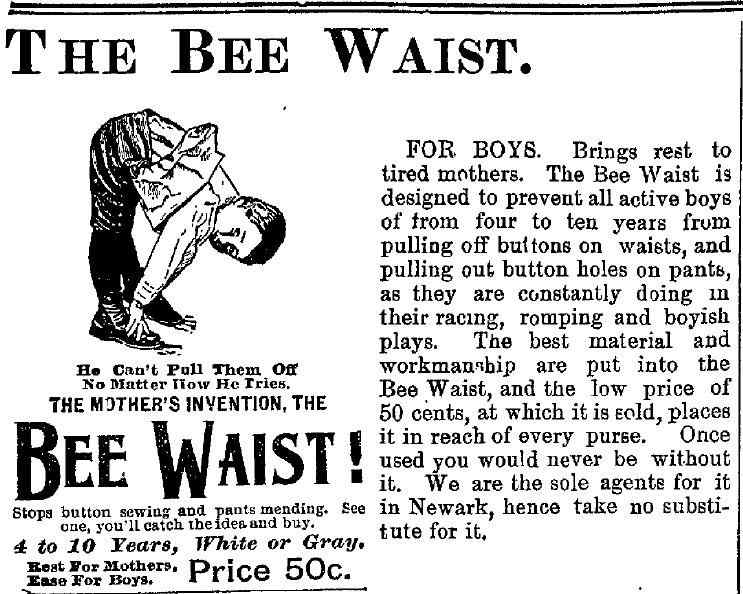
Bee Waists: Newark New Jersey Advertisement (September 1894)
 + +
Figure 1.-We have noticed another Bee Waist advertisement. This one appeared in the Newark Daily Advocate in New Jersey (September 25, 1894). The illustration here clarifies the suspender attachment on the back of the waist, which was less clear in the Ohio advertisement. Here the three suspender straps at the back are clearly buttoned onto the knee pants of the boy and not to his underdrawers.
|
|
We have noticed another Bee Waist advertisement. This one appeared in the Newark Daily Advocate in New Jersey (September 25, 1894). The illustration here clarifies the suspender attachment on the
back of the waist, which was less clear in the Ohio advertisement. Here the three suspender straps at the back are clearly buttoned onto the knee pants of the boy and not to his underdrawers (as we previously thought). So I think we need a revision of our initial explanation. What was confusing in the previous ad was what looked like white underwear buttoned to the waist with the dark knee pants lowered about half-way. This, however, seems to be a misintrepretation of the drawing.
What the artist was trying to convey was trousers buttoned to the waist, but in order to show the buttonholes clearly on the trousers, he whited out the waistband of the trousers and kept the lower section of the trousers dark so that the single garment (the knee pants) had the look of white underwear underneath the lowered trousers. The new ad stresses the point that the boy can't pull off the buttons on the Bee Waist. The buttons would come off on a more weakly constructed waist only if the greater weight of trousers (knee pants),
with pockets often full of stuff, were tugging at the buttons. Underwear alone would probably NOT be enough to pull buttons off a waist. So it is pretty clear that the Bee Waist was intended as a
support for knee pants and not for underdrawers. If you look closely at the Elyria ad, you can see the the white waistband of the trousers has seams that would be part of a boy's underwear.
Here is the text of the new ad:
"The Bee Waist. For Boys. Brings rest to tired mothers. The Bee
Waist is designed to prevent all active boys of from four to ten years
from pulling off buttons on waists, and pulling out button holes on
pants, as they are constantly doing in their racing, romping and boyish
play. The best material and workmanship are put into the Bee Waist,
and the low price of 50 cents, at which it is sold, places it in reach
of every purse. Once used you would never be without it. We are the
sole agents for it in Newark, hence take no substitute for it.
He Can't Pull Them Off No Matter How He Tries. The Mother's Invention,
the Bee Waist! Stops button sewing and pants mending. See one, you'll
catch the idea and buy. 4 to 10 Years, White or Gray. Best for
Mothers. Best for boys. Price 50 cents."
An interesting difference between the two Bee Waist ads (even though
advertised in the same year):. the Newark ad offers the waist in two
colors, White or Gray. No colors are mentioned in the Elyria, Ohio, ad
but the color is obviously white. In the Newark ad, no additional hose
supporters are offered as an inducement to the buyer and included in
the price of 50 cents. If a Mother bought the Bee Waist in Newark, she
would have to buy the supporters for her son separately.
HBC

Navigate the Boys' Historical Clothing catalog/magazine pages:
[Return to the Main 1894 Bee Waist page]
[Return to the Main American mail order 1890s page]
[Main photo/publishing page]
[Store catalogs]
[Fashion magazines]
Navigate the Boys' Historical Clothing Web Site:
[Introduction]
[Activities]
[Biographies]
[Chronology]
[Cloth and textiles]
[Clothing styles]
[Countries]
[Topics]
[Bibliographies]
[Contributions]
[FAQs]
[Glossaries]
[Images]
[Links]
[Registration]
[Tools]
[Boys' Clothing Home]
Navigate the Boys' Historical Clothing Web Site:
[Sailor hats]
[Sailor suits]
[Buster Brown suits]
[Eton suits]
[Rompers]
[Tunics]
[Smocks]
[Pinafores]
[Long stockings]
[Underwear]
Created: 8:48 PM 5/13/2010
Last updated: 8:48 PM 5/13/2010

 +
+

